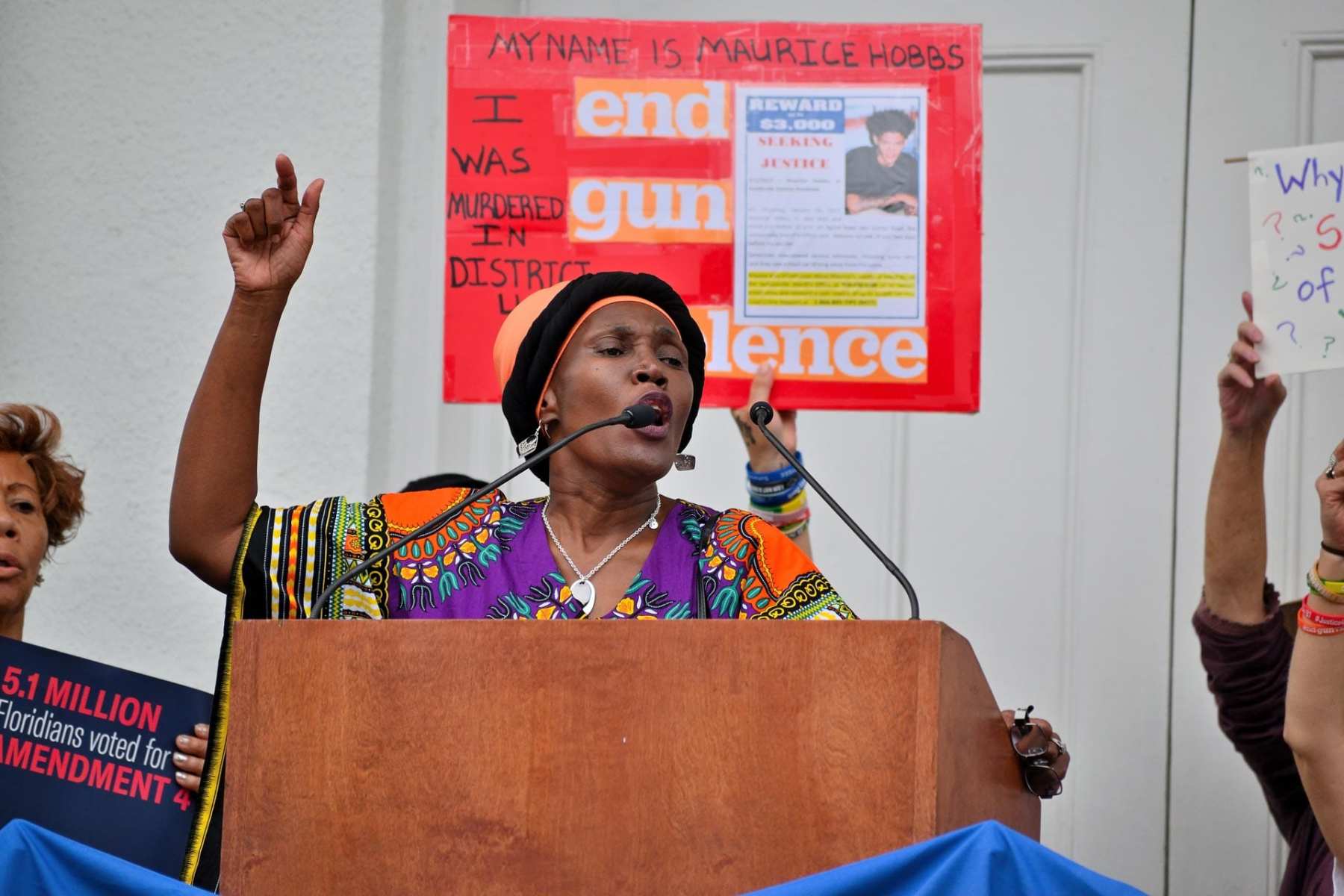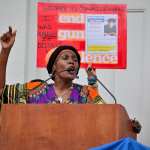In February 2019, Rosemary McCoy and Sheila Singleton got their voter registration cards. The two women were among more than 2,000 freed Floridians who registered to vote that winter, just three months after Florida restored voting rights to approximately 1.5 million formerly incarcerated people. Of those newly registered voters, 44 percent of them were Black, like McCoy and Singleton.
With the backing of nearly two-thirds of the state, the Voting Restoration Amendment, known as Amendment 4, granted the right to vote to those who’d been convicted of felony offenses — barring sexual offenses and murder — so long as they completed their sentence, parole and probation.
In March 2019, the two women from Duval County, home to Jacksonville, cast their votes in a local election.
“I view voting as a part of my life, my livelihood,” McCoy told The 19th. “I get to voice my opinion about the people that’s in office … I get that chance to make a decision … that might be able to change a situation that’s not good for us.”
Amendment 4 granted arguably the largest mass enfranchisement effort since the Voting Rights Act of 1965. But supporters’ celebration soon turned to confusion. In response to the amendment, the Republican-controlled Florida legislature drummed up Senate Bill 7066, which required formerly incarcerated people to pay any restitution, fines, fees or court costs, also known as legal financial obligations, before regaining the right to vote.
“Amendment 4 restores — without regard to the wishes of the victims — voting rights to violent felons, including felons convicted of attempted murder, armed robbery and kidnapping, so long as those felons completed all terms of their sentences. I think this was a mistake and would not want to compound that mistake by bestowing blanket benefits on violent offenders,” Gov. Ron DeSantis wrote in a transmittal letter to the Florida Secretary of State in June 2019 when he made SB 7066 law.
Advocates condemned the law as a modern-day poll tax, which had immediate implications for people like McCoy and Singleton. While SB 7066 was moving through the legislature, the women initiated the process to find out how much money they owed the courts. McCoy learned that she owed about $7,500 in victim restitution, including interest. Around the same time, the court told Singleton she owed about $12,000, including interest. Duval County requires restitution to be paid all at once, and across Florida, payment plans are left to the discretion of the counties, some of which tack on a 40 percent collections fee to unpaid court debt.
For the two breadwinners struggling to find livable wages post incarceration, this meant voting was no longer an option.
“That’s the strangest thing: To get your voting rights back and be able to vote, and then they come and try to take it away again,” Singleton told The 19th. “Isn’t that something?”
McCoy and Singleton are plaintiffs in the only felony disenfranchisement suit alleging a violation of the 19th Amendment, the 100-year old victory that scantily gave women the right to vote.
Nancy Abudu, deputy legal director for the Southern Poverty Law Center (SPLC), said it was important to bring this October 2019 claim on behalf of two Black women, a group historically “siloed” by the 15th Amendment, which accounted for men only, and then again by White suffragists who didn’t even want Black women to march with them.
Abudu said that the discourse around voting is often through a strictly racial lens, making it difficult to find writings or data that account for the ways wealth and gender intersect, and how women of color’s access to the ballot is affected.
“We really are trying to push for legal recognition of the triple impact — unfortunately, oftentimes, burden — of race, class and gender when it comes to accessing voting rights,” Abudu said.
Abudu claims Florida’s law could permanently disenfranchise women like McCoy and Singleton, who struggle to meet expenses in their households because of gender-based and race-based disparities and inequities in the labor force both before and after incarceration.
“The passage of the Nineteenth Amendment granted women the fundamental right to vote,” the lawsuit reads. “There is no compelling governmental interest for denying Plaintiffs and similarly situated women the right to vote solely based on their lower economic status.”
Women represent the fastest growing prison population, increasing at twice the rate of men in the past several decades, with Black and Latina women more frequently incarcerated than White ones.
In the 2016 election, 10 percent of Florida’s voting age population could not vote due to a felony conviction, and approximately one in four Black voters could not cast a ballot due to felony disenfranchisement laws. Taking into account that 21 percent of people living below the poverty line in Florida are Black, the SPLC’s lawsuit alleges that requiring all court costs paid before voting “will have a disparate and disproportionate effect on racial minorities and lower income people.”
Working-age women in Florida are more likely to earn incomes below the poverty line than men, and 25 percent of Black Floridian women live in poverty compared to 12 percent of their White counterparts.
Further compounding the issue are the economics of being a lower-income woman with a criminal record. Although nationwide 57 percent of men made less than $23,000 prior to incarceration, this is true for 72 percent of women. And the gap persists once time’s been served. Data from Prison Policy, a nonpartisan criminal justice think tank, shows the unemployment rate among formerly incarcerated people between the ages of 35 to 44 was 44 percent among Black women and 35 percent for Black men, and 23 percent among White women compared to 18 percent of White men.
“Whatever demographic breakdown you use, Black women are at the bottom,” Abudu said.
In addition to being a 19th Amendment case, the lawsuit makes a 14th Amendment equal-protection claim on the grounds that McCoy and Singleton are barred from voting because of their financial status. The suit also cites the 24th Amendment, which protects against poll taxes. Abudu stresses the importance of evaluating the impact and harm the law causes.
“When you talk about the ability to pay these fines, if you are a woman already making less money, if you are Black and already discriminated against, and if you are poor and don’t even have real access, then of course this requirement is going to have a disparate impact on low-income women of color,” she said.
The SPLC’s claim was consolidated with four other Florida felony disenfranchisement cases that have been entangled in the courts for the past year. Following a bench trial in May, U.S. District Judge Robert Hinkle ruled that Florida could not block people from voting because of unpaid court costs.
DeSantis’ lawyers kept pushing, and filed an appeal, citing state’s rights to “disenfranchise felons permanently” and the necessity to “preserve the decision of the People of Florida to insist that a full measure of justice…be served by all felons before restoring their rights to vote.”
The 11th Circuit scheduled a rare “en banc,” or full court hearing, at DeSantis’ request, and also issued a stay of Hinkle’s court ruling pending the outcome of appeal.
The hearing is set for August 18 — the same day as Florida’s primary elections. So for now, formerly incarcerated people who owe money to the courts can’t register to vote or participate in the upcoming primaries.
August 18 will be “a huge day,” Abudu put it, not just because of primaries or the hearing. It also marks the centennial of the 19th Amendment’s ratification.
“It’s not just about voting,” Abudu said. “It’s about what does having the vote mean when it comes to improving women’s lives, and for women of color, that goal hasn’t fully been realized.”
Abudu and the other attorneys filed an application for the U.S. Supreme Court to vacate the stay. On July 16, days before Florida’s voter registration deadline for the primaries, the Supreme Court declined to intervene. The three women on the bench, Justices Elena Kagan, Ruth Bader Ginsburg and Sonya Sotomayor, dissented.
Sotomayor, who wrote the dissenting opinion, said that the Supreme Court’s majority — who did not pen an opinion — prevents eligible voters from participating in the election “simply because they are poor” and disrupts the election process just ahead of the voter-registration deadline, creating both “confusion” and “voter chill,” citing the 2006 U.S. Supreme Court Decision Purcell v. Gonzalez.
“This Court’s inaction continues a trend of condoning disfranchisement,” she wrote.
Abudu said she knew getting the Supreme Court to rule on an emergency order would not be an easy endeavor. She felt Sotomayor’s dissent was “common sense” and demonstrated that she is “rooted in reality.”
“You cannot have people sitting in judgment of policies without being more sensitive to the real impacts of their decisions,” Abudu said. “That’s what’s disappointing about the Supreme Court’s majority opinion, and what is so wonderful about at least having someone like Justice Sotomayor. While it would have been nice for a man to step up and speak up on behalf of women in that way, that’s why women are on that bench, because unfortunately a lot of men just don’t have the courage to do that.”
Following the Supreme Court’s decision, Abudu said she called McCoy and Singleton to break the news — “a slap in the face,” Abudu called it — that they will not be able to legally vote in August, and their eligibility for November will depend on how the case pans out.
“It’s a reminder that they are not valued, their voices are not considered important enough to participate, and as Black women it carries extra value because that is how Black women in this country historically and today often are treated and therefore feel,” Abudu said. “That’s why we’re going to continue to fight because we just cannot allow that mentality enshrined in court decisions to prevail.”
In her dissent, Justice Sotomayor referenced the risk of prison time for anyone who mistakenly tries to vote before having their votes restored, even if done out of confusion. She said that put people at risk for potential criminal prosecution for “failing to follow the abrupt change.”
“In short, the plaintiffs have raised serious claims, some of which the Eleventh Circuit already found likely to succeed,” Sotomayor wrote. “Because the parties’ rights and the legal framework had been well established, it was an error for the Eleventh Circuit to reverse course in an unexplained stay order right before an election.”
This threat wears no veil — it became reality for Crystal Mason, a Black woman in her 40s from Fort Worth, Texas, who was sentenced to prison for casting an uncounted provisional ballot in 2016.
Mason, a mother of three and caretaker of her grandson, calls herself the head of her family. When she completed her prison sentence in 2016 for a tax fraud charge, she was looking forward to her liberties: becoming an esthetician and regaining the right to vote — a civic duty her mother instilled in her from a young age.
In the November 2016 election, she was still on federal supervised release, which is similar to probation. Unbeknownst to Mason, that made voting illegal.
When Mason showed up to her polling location just before it closed, she realized she wasn’t on the voting roll. She filled out a provisional ballot, carefully writing out her personal information after poll workers assured her that if she’s at the right place it would count, if she’s not, it won’t.
A few months later, Mason was arrested. At her single-day bench trial (there was no jury) in March 2019, Mason said she had not read the left side of the provisional ballot that makes signees swear they completed any criminal punishments such as probation and parole. Her supervision officer told the court that he didn’t tell Mason she couldn’t vote while on supervised release — it wasn’t something his office did normally.
Judge Ruben Gonzalez sentenced Mason to five years in prison for illegal voting. This conviction violated her terms of the federal supervised release, sending her back to federal prison for 10 months, time she has since served.
“I think that what we’ve seen throughout our history is that the right to vote on paper and the right to vote in reality can mean very different things,” said Thomas Buser-Clancy, a senior staff attorney for the ACLU of Texas who is representing Mason. “The constant threat especially for people of color to their voting rights is part of America’s history. But it only underscores the importance of that right and the need to exercise that right to always take advantage of the ability to vote.”
Mason’s supporters point out that in 2017, Terri Lynn Rote, a White Iowan woman who was convicted for voter fraud after trying to vote for then-candidate Donald Trump twice, only received two years of probation and a $750 fine.
The ACLU highlighted that in April 2018, the same office that prosecuted Mason sentenced a White Republican justice of the peace to five years probation for submitting fake signatures to secure his slot on the primary ballot.
Buser-Clancy said Texas’ attorney general and state prosecutors are committed to making voting harder and scarier. Electing prosecutors who understand their power without wielding it over their constituents is critical, he said, and so is mitigating the confusion around who is eligible to vote.
“As Crystal herself would tell you, she, after a lot of reflection, has decided to use this as an opportunity to tell people if they’re eligible, how important it is to vote, and how critical it is for individuals to express their right to vote through the polls,” Buser-Clancy said.
In March of this year a three-judge panel in the Court of Appeals for the Second District of Texas denied Mason’s appeal, and her lawyers are pursuing a review by the full court. Mason is out on bail awaiting the resolution of this appeals case.
Blair Bowie, who manages the Campaign Legal Center’s Restore Your Vote Campaign, warned Floridians at the end of 2018 that unless their secretary of state committed to an education and outreach campaign following Amendment 4, the state could fall into Alabama’s same failings to restore voting rights.
Prior to August 2017, Alabama permanently disenfranchised those convicted of crimes of “moral turpitude,” a once undefined term left to the discretion of individual localities and registrars. When Gov. Kay Ivey signed the Definition of Moral Turpitude Act to enumerate the crimes that permanently discard voting rights, approximately 76,000 Alabamians became eligible to vote again — in theory.
As Bowie stated in her op-ed to Floridians, nearly three in four Alabama residents who lost their voting rights due to a felony conviction had not heard about the law change that restored their right to vote, according to a survey by the Alabama Appleseed Center for Law & Justice. Alabama also kept in place the laws that required formerly incarcerated people to clear a poll tax by way of legal financial obligations, according to Al.com.
The Campaign Legal Center filed Thompson v. Alabama on behalf of Treva Thompson, a 51-year-old Black woman from Huntsville, Ala., who completed her parole and probation in 2015 and applied to register to vote. Although she meets the requirement to vote due to the redefinition of moral turpitude crimes, she cannot vote because the court system says she owes $40,000 in debts she can’t afford.
This case is still pending in Alabama federal courts.
While Thompson v. Alabama is named for a woman who lost her voting rights, Bowie said when it comes down to analyzing Alabama’s disenfranchised community, she has not seen a breakdown of how it impacts different groups of women.
“You’re the first person who’s asked,” she said.
From her grassroots experience, Bowie said she’s helped a fair number of women who say their conviction was related to supporting their family: food stamp fraud, bad checks. “It’s usually, ‘I was trying to feed my kids.’ ‘I was trying to support my family.’ ‘I was trying to put food on the table.’ That burden often falls on women.”
Maine and Vermont are the only two states in the union where voting from prison is allowed, with no impact on voting rights after prison either. Only 16 states and Washington, D.C., restore voting rights immediately upon release from prison. The rest of the country hinges on a patchwork of often confusing laws to restore rights post-incarceration, with at least 21, including Alabama and Florida, mandating that formerly incarcerated people complete parole, probation, and often pay any outstanding debts before voting.
Kentucky and Virginia are the only two states that ban voting for life following a felony conviction unless the governor intervenes by executive order. Kentucky’s Gov. Andy Beshear restored voting rights to more than 140,000 people two days after taking office in December 2019, applying only to those convicted of non-violent crimes, and leaving in place the permanent ban for many.
Earlier this month, Gov. Kim Reynolds of Iowa restored voting rights to those who completed their sentences, parole and probation, regardless of any debts they owe courts or victims, thus shedding its superlative as the only state in the nation to permanently disenfranchise people with a felony record unless they appealed directly to the governor.
Bowie is now working on litigation in Tennessee over laws that disenfranchise people with out-of-state felony convictions, even if those other states have restored their rights. The complicated nature of the laws will keep some away from the polls forever, Bowie said.
“It’s a form of passive voter suppression, drafting the laws in a complicated way or allowing them to become complicated over time,” Bowie said. “When there’s confusion, folks who have been through the criminal-legal system will default to not voting because they don’t want to get pulled back into that system just for casting a ballot. They’re way more likely to err on the side of not voting.”
If they could, Rosemary McCoy and Sheila Singleton would be showing up to the polls to vote the current president out of office.
They both think losing their voting rights ahead of the 2020 presidential election is indisputably rooted in partisanship, especially since the Republican Party dominates the Florida statehouse.
“Their whole main thing is for us not to vote,” McCoy said in an interview. “We won the people when we won Amendment 4 … we believe that we already won but they’re just stalling because of the election.”
McCoy is tired of what she sees as hypocrisy and injustice: She paid taxes on canteen items in prison; prisoners are accounted for in the census, so why are they barred from participating in democracy even after they served their time?
“You want me to pay taxes, but I don’t get any representation?” she said. “My little income helps pay your salary, but you don’t want to represent me? I don’t get any representation? None of us, 1.5 million, plus those coming out, zero presentation.”
Singleton believes that Florida’s leadership is hindering voting access because of their loyalty to the president.
“We’re just going to be real about it: all of this ties around the election,” Singleton said. “OK, we know that our mayor and our governor are fond of Trump, right? So they’re going to do everything they can to stop us from voting due to Trump running in this election … We see them; we know what’s going on. But trying to get other people to see what’s going on is a big issue.”
McCoy and Singleton work as advocates with the New Florida Majority, a grassroots organization focused on voting access among other social justice campaigns. They say they’ve grown much closer fighting together through this “living hell.”
“I wouldn’t be a part of the lawsuit if it wasn’t for Rosemary,” Singleton said. “She made us aware of what was going on.”
Singleton stresses that this issue not only impacts Black communities, but rather anyone with family who goes through the system and comes out with debts they can’t pay.
“I think a lot of times until people go through it, they’ll understand our point of view or what we’re trying to say,” she said.
McCoy wants justice, and for that to happen, she says it’s important to get the word out.
“The truth should be told that everyone should have the right to vote regardless of their situation,” she said. “Voting is not connected to whatever you did.”





